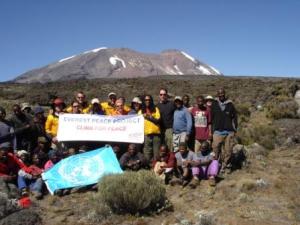
On a trip to Gibraltar signs warned us to beware the friendly apes - "Do not feed the apes!" it warned, "Apes may bite!" In this week's parsha we learn all about what happens when you worry too much... although... maybe this is one we should have worried about: These apes really DID bite!
Okay, I’ll admit it: I worry too much. I don’t think I’m alone in this quality, which seems to rear its ugly head even more frequently when it comes to travel. After all, so many things suddenly seem dangerous! The taxi drivers don’t follow any rules of the road, there are suspicious characters all over the place, and there’s nothing to eat! Everything is a cause for worry. And I am good at worrying.
But I don’t feel too bad about it because it seems like I’m in good company. I don’t want to say it’s genetic, but perhaps worrying is a cultural thing. Worrying is just a Jewish thing to do, like slipping a napkin of leftovers into your purse at a buffet or haggling over a few cents with a street vendor. But just because it’s Jewish doesn’t make it good, or even alright.
The fact is, worrying has caused the Jewish people a lot of anguish over the years. When the spies went into the land of Israel and came back with their report, they didn’t actually say anything bad, per se – they simply reported what was really there: large fruits, large trees, large people, and lots of funerals. But what they all brought back with them was worry. They were worried about how the Jewish people could ever conquer such a land and, like some sort of spiritual disease, that worry infected the Jewish people and they began to cry. And we continue to cry… we have been crying ever since, on the tragic day of Tisha B’Av.
Ha’Rav Nissim Karelitz has an amazing saying that Rabbi Yaakov Yagen suggests as an explanation for all this worrying: “Hishtadlus begins where bitachon ends.” There is a concept that we are partners with G-d: We have to put forth some effort, do some work and G-d will help us. This is hishtadlus. There is also the concept that if we have complete trust in G-d, we won’t need to worry about a thing. This is bitachon. Where our trust in G-d ends is when we must begin to work.
The spies saw how difficult conquering the land seemed. When they realized they had these thoughts, they recognized that they were low on bitachon. Because they were low on bitachon, they knew they had work to do (hishtadlus). So they tried to put in their fair share of work: They tried to formulate military plans and think of how to conquer the land… but when they did this they realized it would be an impossible battle. When they couldn’t figure out what hishtadlus to do, they began to worry and they began to cry.
It’s an important lesson for us travelers. If we can only learn to have trust in G-d, then we won’t need to waste our time worrying about things. Rabbi Ben and I have never, thank G-d, had to sleep a night on the street for lack of a place to stay, yet we never make reservations ahead of time: This is trust; this is bitachon, and it would never occur to either of us to doubt it. But we all have our weak spots and I have come to realize that when it comes to wild taxi rides and suspicious people, my bitachon needs quite a bit of work. As long as we recognize this, we can do our hishtadlus. If we put in our effort, we won’t need to worry.
As we journey into the coming week, let’s all focus on increasing our level of trust in G-d. If we have true bitachon, we will never have a cause to worry. And I think that a life free of worry is a benefit to any of us!
Shabbat Shalom!
Read More









